人教版七年级下册英语各单元知识点总结归纳
- 格式:pdf
- 大小:257.16 KB
- 文档页数:19
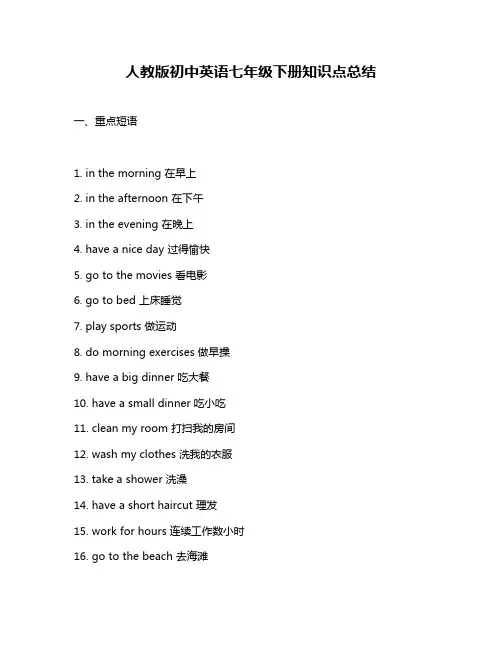
人教版初中英语七年级下册知识点总结一、重点短语1. in the morning 在早上2. in the afternoon 在下午3. in the evening 在晚上4. have a nice day 过得愉快5. go to the movies 看电影6. go to bed 上床睡觉7. play sports 做运动8. do morning exercises 做早操9. have a big dinner 吃大餐10. have a small dinner 吃小吃11. clean my room 打扫我的房间12. wash my clothes 洗我的衣服13. take a shower 洗澡14. have a short haircut 理发15. work for hours 连续工作数小时16. go to the beach 去海滩17. on the weekend 在周末18. listen to music 听音乐19. have a party 举办聚会20. watch TV 看电视21. play computer games 玩电脑游戏22. in the pool 在游泳池里23. go to the zoo 去动物园24. in the mountains 在山里25. have fun 玩得开心26. the great wall 长城27. many places of interest 名胜古迹28. be ready for 为……准备好29. stay healthy 保持健康30. how much 多少31. would you like 一些……吗?32. some noodles 一些面条33. order a pizza 定一个披萨饼34. make a phone order 电话订购35. would you like to do sth 你愿意做某事吗?36. want to do sth 想做某事37. would you like +名词你愿意要……吗?38. would you like +动词不定式你愿意……吗?39. choose some food 选择一些食物40. order the food 订购食物41. be careful 当心;小心42. not much 不多;少量的43. be ready to do sth 准备好做某事。
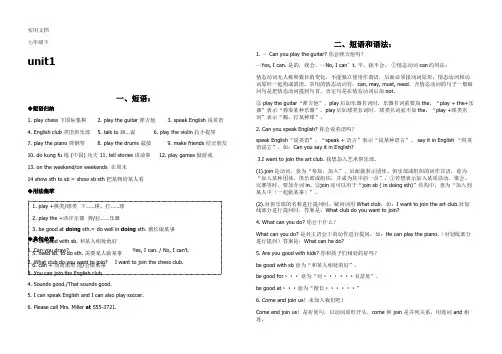
七年级下unit1一、短语:◆短语归纳1. play chess 下国际象棋2. play the guitar 弹吉他3. speak English 说英语4. English club 英语俱乐部5. talk to 跟…说6. play the violin 拉小提琴7. play the piano 弹钢琴8. play the drums 敲鼓9. make friends 结交朋友10. do kung fu 练 (中国) 功夫 11. tell stories 讲故事 12. play games 做游戏13. on the weekend/on weekends 在周末14 show sth to sb = show sb sth 把某物给某人看◆用法集萃◆典句必背1. Can you draw? Yes, I can. / No, I can’t.2. What club do you want to join? I want to join the chess club.3. You can join the English club.4. Sounds good./That sounds good.5. I can speak English and I can also play soccer.6. Please call Mrs. Miller at 555-3721.二、短语和语法:1. — Can you play the guitar? 你会弹吉他吗?—Yes, I can. 是的,我会。
—No, I can’t. 不,我不会。
①情态动词can的用法:情态动词无人称和数目的变化,不能独立使用作谓语,后面必须接动词原形,情态动词和动词原形一起构成谓语。
常用的情态动词有:can, may, must, need。
含情态动词的句子一般疑问句是把情态动词提到句首,否定句是在情态动词后加not。
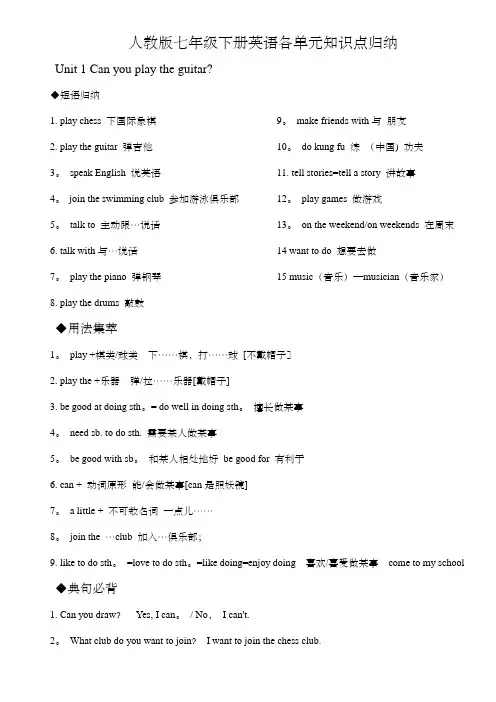
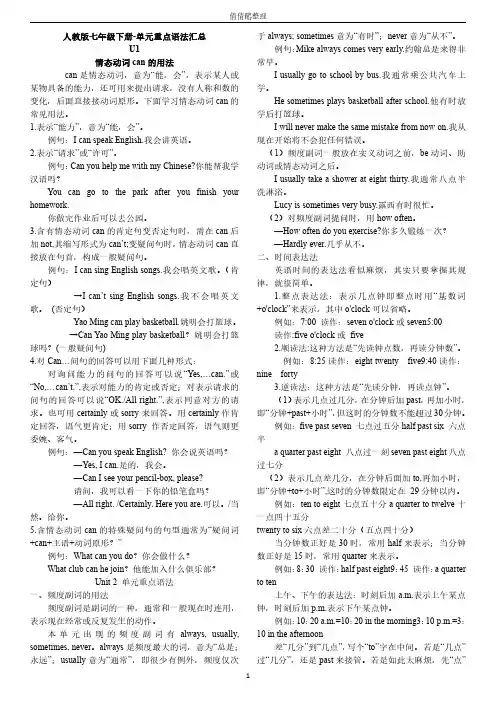
人教版七年级下册-单元重点语法汇总U1情态动词can的用法can是情态动词,意为“能,会”,表示某人或某物具备的能力,还可用来提出请求,没有人称和数的变化,后面直接接动词原形。
下面学习情态动词can的常见用法。
1.表示“能力”,意为“能,会”。
例句:I can speak English.我会讲英语。
2.表示“请求”或“许可”。
例句:Can you help me with my Chinese?你能帮我学汉语吗?You can go to the park after you finish your homework.你做完作业后可以去公园。
3.含有情态动词can的肯定句变否定句时,需在can后加not,其缩写形式为can’t;变疑问句时,情态动词can直接放在句首,构成一般疑问句。
例句:I can sing English songs.我会唱英文歌。
(肯定句)→I can’t sing English songs.我不会唱英文歌。
(否定句)Yao Ming can play basketball.姚明会打篮球。
→Can Yao Ming play basketball?姚明会打篮球吗?(一般疑问句)4.对Can…问句的回答可以用下面几种形式:对询问能力的问句的回答可以说“Yes,…can.”或“No,…can’t.”,表示对能力的肯定或否定;对表示请求的问句的回答可以说“OK./All right.”,表示同意对方的请求。
也可用certainly或sorry来回答。
用certainly作肯定回答,语气更肯定;用sorry作否定回答,语气则更委婉、客气。
例句:—Can you speak English?你会说英语吗?—Yes,I can.是的,我会。
—Can I see your pencil-box,please?请问,我可以看一下你的铅笔盒吗?—All right./Certainly.Here you are.可以。
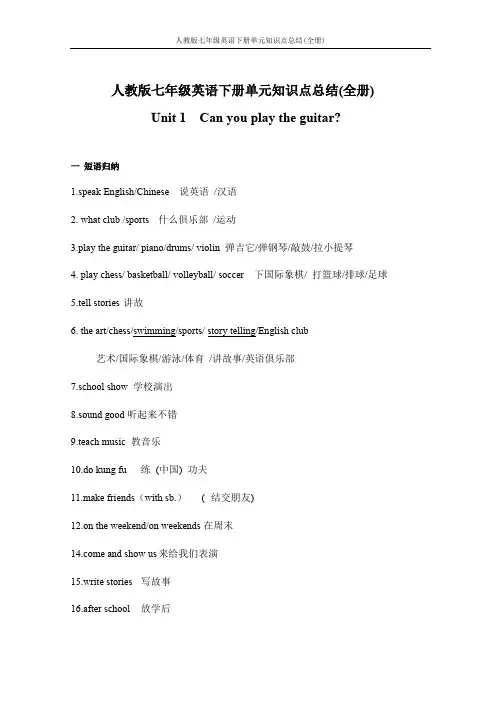
人教版七年级英语下册单元知识点总结(全册)Unit 1 Can you play the guitar?一短语归纳1.speak English/Chinese 说英语/汉语2. what club /sports什么俱乐部/运动3.play the guitar/ piano/drums/ violin 弹吉它/弹钢琴/敲鼓/拉小提琴4. play chess/ basketball/ volleyball/ soccer 下国际象棋/ 打篮球/排球/足球5.tell stories讲故6. the art/chess/swimming/sports/ story telling/English club艺术/国际象棋/游泳/体育/讲故事/英语俱乐部7.school show 学校演出8.sound good听起来不错9.teach music 教音乐10.do kung fu练(中国) 功夫11.make friends(with sb.)(结交朋友)12.on the weekend/on weekends在周末e and show us来给我们表演15.write stories写故事16.after school放学后17.English-speaking students说英语的学生18.play games 做游戏19.the Students’ Sports Center学生运动中心20.at the old people’s home在老人之家21.be in our school music festival 参加学校音乐节22.jion the music club加入音乐俱乐部二用法集萃1. play +棋类/球类下……棋,打……球2. play the +乐器弹/拉……乐器3. be good at doing sth.擅长做某事be good for.. 对… 有好处be good /kind to … 对… 友好4. be good with sb. 和某人相处地好; 善于应付(处理)…5. need(sb./sth.)to do… 需要(某人/某物)做….6. can + 动词原形能/会做某事7. a little + 不可数名词: 一点儿……9. like to do sth.或like doing sth. 喜欢做某事10.want to do…想做……11.What about…?…怎么样?(后面接Ving/代词/名词)12. talk用法: talk to/with sb. 跟某人说话talk about sth. 谈论某事tell 用法:tell sb sth. 告诉某人某事tell sb to do sth 告诉某人去做某事tell stories 讲故事say用法:say直接加说话的内容/itspeak用法:speak +语言13.help sb. with sth在某方面帮助某人= help sb.(to)do sth14.be free /busy有空/很忙15. call sb. at+号码拨打某人的……号码16. be in=join …成为…中的一员(P6)17.want …for the school show为学校表演招聘……三典句必背1. Can you draw? 你会画画吗?Yes, I can. / No, I can’t.是,我会。
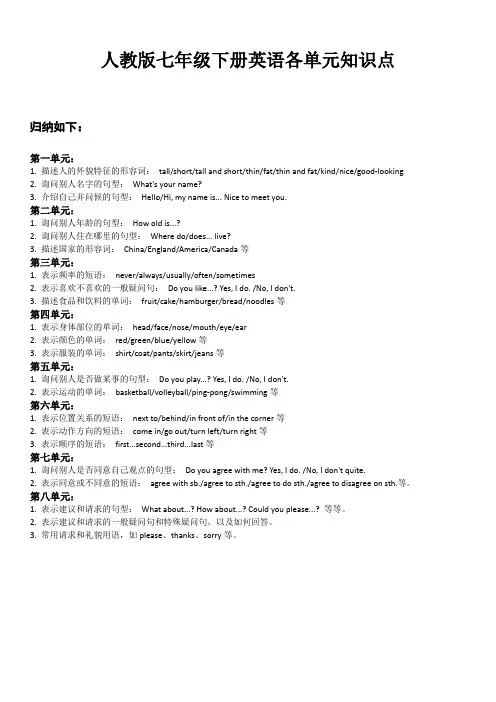
人教版七年级下册英语各单元知识点归纳如下:第一单元:1. 描述人的外貌特征的形容词:tall/short/tall and short/thin/fat/thin and fat/kind/nice/good-looking2. 询问别人名字的句型:What's your name?3. 介绍自己并问候的句型:Hello/Hi, my name is... Nice to meet you.第二单元:1. 询问别人年龄的句型:How old is...?2. 询问别人住在哪里的句型:Where do/does... live?3. 描述国家的形容词:China/England/America/Canada等第三单元:1. 表示频率的短语:never/always/usually/often/sometimes2. 表示喜欢不喜欢的一般疑问句:Do you like...? Yes, I do. /No, I don't.3. 描述食品和饮料的单词:fruit/cake/hamburger/bread/noodles等第四单元:1. 表示身体部位的单词:head/face/nose/mouth/eye/ear2. 表示颜色的单词:red/green/blue/yellow等3. 表示服装的单词:shirt/coat/pants/skirt/jeans等第五单元:1. 询问别人是否做某事的句型:Do you play...? Yes, I do. /No, I don't.2. 表示运动的单词:basketball/volleyball/ping-pong/swimming等第六单元:1. 表示位置关系的短语:next to/behind/in front of/in the corner等2. 表示动作方向的短语:come in/go out/turn left/turn right等3. 表示顺序的短语:st等第七单元:1. 询问别人是否同意自己观点的句型:Do you agree with me? Yes, I do. /No, I don't quite.2. 表示同意或不同意的短语:agree with sb./agree to sth./agree to do sth./agree to disagree on sth.等。
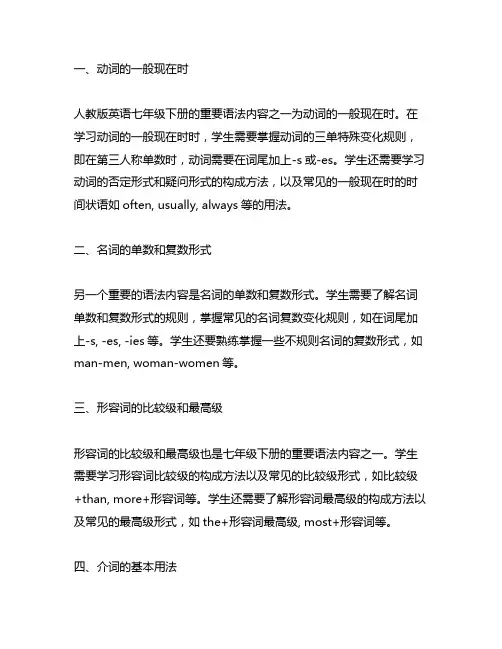
一、动词的一般现在时人教版英语七年级下册的重要语法内容之一为动词的一般现在时。
在学习动词的一般现在时时,学生需要掌握动词的三单特殊变化规则,即在第三人称单数时,动词需要在词尾加上-s或-es。
学生还需要学习动词的否定形式和疑问形式的构成方法,以及常见的一般现在时的时间状语如often, usually, always等的用法。
二、名词的单数和复数形式另一个重要的语法内容是名词的单数和复数形式。
学生需要了解名词单数和复数形式的规则,掌握常见的名词复数变化规则,如在词尾加上-s, -es, -ies等。
学生还要熟练掌握一些不规则名词的复数形式,如man-men, woman-women等。
三、形容词的比较级和最高级形容词的比较级和最高级也是七年级下册的重要语法内容之一。
学生需要学习形容词比较级的构成方法以及常见的比较级形式,如比较级+than, more+形容词等。
学生还需要了解形容词最高级的构成方法以及常见的最高级形式,如the+形容词最高级, most+形容词等。
四、介词的基本用法介词是英语中一个重要的语法内容,学生需要掌握介词的基本用法,包括介词表示地点、时间、方向、原因等的用法,以及介词与动词、名词、形容词的搭配。
学生还需要学习一些常用介词的用法,如in, on, under, behind, between等。
五、情态动词情态动词是七年级下册的另一个重要语法内容。
学生需要了解情态动词can, could, may, might, must, shall, should, will, would等的用法和意义,并能正确运用这些情态动词进行句子的构成。
学生还需要学习情态动词的否定形式和疑问形式的构成方法。
六、并列连词和从属连词七年级下册还包括并列连词和从属连词的学习。
学生需要了解并掌握一些常见的并列连词如and, but, or等的用法,以及从属连词如because, when, if, although等的用法。

人教版英语七年级下册Units1-4单元知识点归纳总结Unit1Can you play the guitar?一、重点短语1.at the old people's home在敬老院2.be good at singing善于唱歌3.be good at swimming善于游泳4.be good at dancing跳舞5.be good with old people与老人相处得好6.be in our school music festival参加我们学校的音乐节e and show us来给我们展示一下e to the Students'Sports Center来学生运动中心9.do Chinese kung fu表演中国功夫10.English-speaking students说英语的学生11.help with sports在运动方面提供帮助12.in the music room在音乐室13.in the school music club在学校音乐俱乐部14.in the school show在学校汇演中15.join the swimming club加入游泳俱乐部16.like drawing/like to draw喜欢画画17.make friends with sb.和某人交朋友18.musicians wanted招聘音乐家19.need help to teach music需要帮助去教音乐20.on the weekend/on weekends(在)周末21.play chess下国际象棋22.play games with people与人玩游戏23.play the drums打鼓24.play the guitar弹吉他25.play the piano弹钢琴26.play the violin拉小提琴27.students wanted for the school show为学校演出招募学生28.tell stories讲故事29.the story telling club讲故事俱乐部30.talk to/with和某人谈话31.talk with sb.about sth.和某人谈论某事二、重点句型1.—Can you play the guitar or the violin?你会弹吉他还是拉小提琴?—I can play the guitar.我会弹吉他。
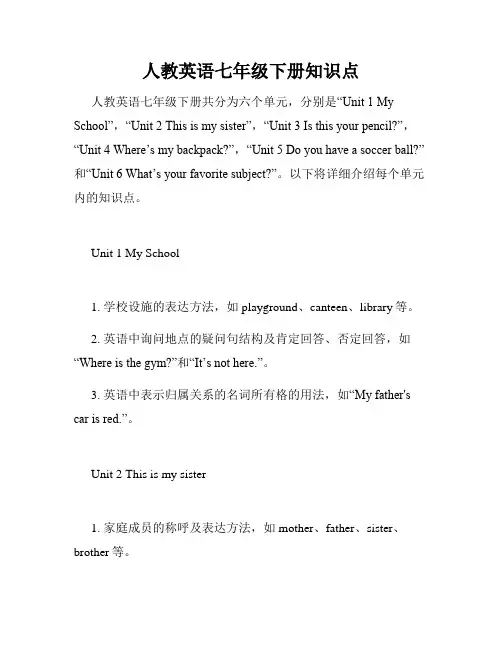
人教英语七年级下册知识点人教英语七年级下册共分为六个单元,分别是“Unit 1 My School”,“Unit 2 This is my sister”,“Unit 3 Is this your pencil?”,“Unit 4 Where’s my backpack?”,“Unit 5 Do you have a soccer ball?”和“Unit 6 What’s your favorite subject?”。
以下将详细介绍每个单元内的知识点。
Unit 1 My School1. 学校设施的表达方法,如playground、canteen、library等。
2. 英语中询问地点的疑问句结构及肯定回答、否定回答,如“Where is the gym?”和“It’s not here.”。
3. 英语中表示归属关系的名词所有格的用法,如“My father's car is red.”。
Unit 2 This is my sister1. 家庭成员的称呼及表达方法,如mother、father、sister、brother等。
2. 英语中询问身份的疑问句结构及肯定回答、否定回答,如“Is she your sister?”和“Yes, she is.”。
3. 英语中表示所有物的物主代词的用法,如“her book”和“his pen”。
Unit 3 Is this your pencil?1. 学习询问和表达物品所有者的语句结构,如“Is this your pencil?”和“No, it’s not mine. It’s Jack’s.”。
2. 学习询问和表达物品的名称的疑问句结构及肯定回答、否定回答,如“Is this a pencil?”和“Yes, it is.”。
3. 学习数词和颜色词的表达方法,如“two, three, blue, red”等。
Unit 4 Where’s my backpack?1. 学习问路及表述方向的语句结构,如“Excuse me, where is the post office?”和“Go straight and turn left.”。
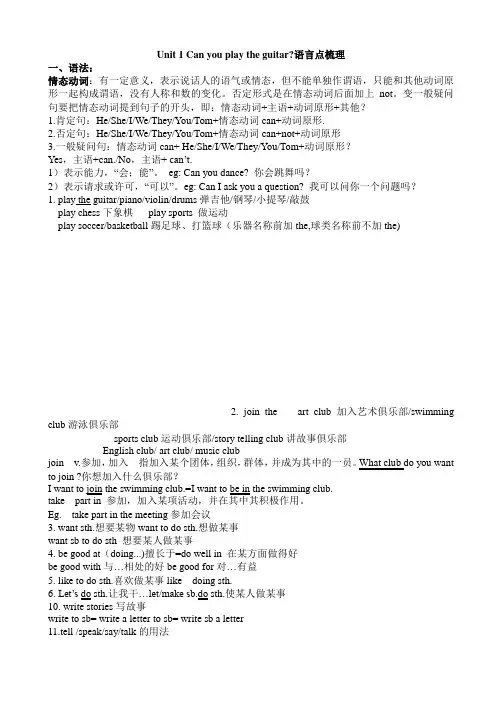
Unit 1 Can you play the guitar?语言点梳理一、语法:情态动词:有一定意义,表示说话人的语气或情态,但不能单独作谓语,只能和其他动词原形一起构成谓语,没有人称和数的变化。
否定形式是在情态动词后面加上not。
变一般疑问句要把情态动词提到句子的开头,即:情态动词+主语+动词原形+其他?1.肯定句:He/She/I/We/They/You/Tom+情态动词can+动词原形.2.否定句:He/She/I/We/They/You/Tom+情态动词can+not+动词原形3.一般疑问句:情态动词can+ He/She/I/We/They/You/Tom+动词原形?Yes,主语+can./No,主语+ can’t.1)表示能力,“会;能”。
eg: Can you dance? 你会跳舞吗?2)表示请求或许可,“可以”。
eg: Can I ask you a question? 我可以问你一个问题吗?1. play the guitar/piano/violin/drums弹吉他/钢琴/小提琴/敲鼓play chess下象棋play sports 做运动play soccer/basketball踢足球、打篮球(乐器名称前加the,球类名称前不加the)2. join the art club加入艺术俱乐部/swimming club游泳俱乐部sports club运动俱乐部/story telling club讲故事俱乐部English club/ art club/ music clubjoin v.参加,加入指加入某个团体,组织,群体,并成为其中的一员。
What club do you want to join ?你想加入什么俱乐部?I want to join the swimming club.=I want to be in the swimming club.takeEg. take part in the meeting参加会议3. want sth.想要某物want to do sth.想做某事want sb to do sth 想要某人做某事4. be good at(doing...)擅长于=do well in 在某方面做得好be good with与…相处的好be good for对…有益5. like to do sth.喜欢做某事like doing sth.6. Let’s do sth.让我干…let/make sb.do sth.使某人做某事10. write stories写故事write to sb= write a letter to sb= write sb a letter11.tell /speak/say/talk的用法1) tell讲述一件事实或故事等及物动词tell sb. sth 给某人讲某事=tell sth to sb 把某事告诉某人tell sb. to do sth 告诉某人做某事tell stories讲故事=tell a story tell a lie撒谎2)speak v. 主要是讲说话的能力,往往接语言speak English讲英语3)talk 为不及物动词往往加介词再接宾语talk to sb.和…交谈/talk with sb.和…交谈(指双方)4)say往往接说话的内容eg.Our teacher says we should study hard.say it in English用英语说它12. make friends with sb.和…交朋友13. play games with sb.和…做游戏14. help sb. with sth.= help sb. (to) do sth.帮助某人做某事15. call sb. at +电话号码给某人打电话拨+号码16. on /at the weekend 在周末on weekends after school放学后17.do Chinese kung fu 打中国功夫18.be free 空闲的19. sing very well 唱得好That sounds good. 那听起来很好20.English-speaking students 讲英语的学生学生运动中心23.also /too/eitheralso/too用在肯定句,also 用于句中,too 用于句尾,either用于否定句句未eg. I am a student . He is a student,too. I am a student . He is also a student.I am not a student . He is not a student, either.24.and/or 连接两个并列成分eg.I can sing and dance.(and用于肯定句)I can’t sing or dance.(or用于否定句)Can you sing or dance ?(or用于选择疑问句“或者”)25.at27. need to do sth需要干某事need sb. to do sth 需要某人干某事28.wanted students for School show学校表演招聘学生v.展示;给….看… show sb. Sth= show Sth to sb.给某人展示n.节目;表演TV show电视节目29.teach v.教,讲授teacher n.教师teach sb.English教某人英语teach sb. sth .= teach sth to sb.教给某人某事=教某事给某人teach sb.to do sth教给某人做某事30.music n.音乐musician n. 音乐家31.piano (pl.) pianosUnit 2 What time do you go to school?知识点梳理1.What time do you get up?What time +助动词do/does +主语+动词原形,询问某人做某事的具体时间。
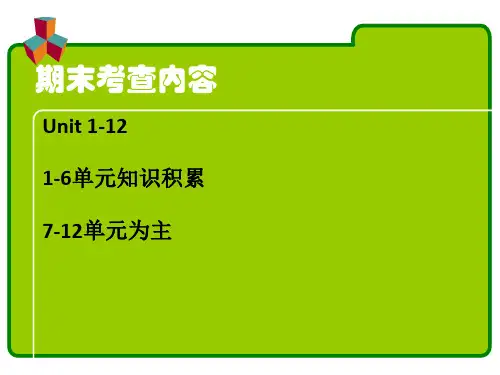
新人教版七年级英语下册知识点总结Unit 1 Can you play the guitar?◆短语归纳1. play chess下国际象棋2. play the guitar弹吉他3. speak English说英语4. English club英语俱乐部5. talk to跟 (6)play the violin拉小提琴7. play the piano弹钢琴8. play the drums敲鼓9. make friends结交朋友10. do kung fu练(中国)功夫11. tell stories讲故事12. play games做游戏13. on the weekend/on weekends在周末◆用法集萃1. play +棋类/球类下……棋,打……球2. play the +西洋乐器弹/拉……乐器3. be XXX.擅长做某事4. be good with sb.和或人相处地好5. need sb. to do sth.需求或人做某事6. can +动词原形能/会做某事7. a little +不成数名词一点儿……8.join the …club插手…俱乐部9. like to do sth. =love to do sth.喜爱/爱好做某事◆典句必背1. Can you draw?Yes, I can. / No, I can’t.2. What club do you want to join?I want to join the chess club.3. You can join the English club.4. XXX.5. I can speak English and I can also play soccer.6. Please call Mrs. Millerat555-3721.Unit 2 What time do you go to school?◆短语归结1. what time几点4. XXX洗淋浴7. do homework做家庭功课2. go to school去上学5. XXX刷牙3.getup起床6.getto到达8. go to work去上班9.XXX回家12.gethome10. XXX吃早饭11. get dressed穿上衣服到家13.either…or…要么…要么…14. go to bed上床睡觉15. XXX在上午/下战书/早晨16. take a walk漫步17. lots of=a lot of很多,大量电台19. XXX在晚上20. be XXX迟到◆用法集萃1. at +详细工夫点在几点(几分)2. XXX/XXX吃早饭/午饭/晚饭3. XXX基数词……点半4. XXX基数词差一刻到……点处置……举动5. take a/an +名词- 1 -6.从……到……from …to …7. need to do sth需要做某事18.XXX◆典句必背XXX.3. When do students usually eat dinner?They usually eat XXX XXX.4. In the evening, I either watch TV or play computer games.5. At twelve, XXX..6.She knows it’s not good for her, but it tastes good.7. Here are your XXX.◆短语归结1. get to school抵达黉舍2. take the XXX乘地铁3.XXX骑自行车4. how far多远5. from home to school从家到学校6.every day每天7. take the bus乘公共汽车8. by XXX骑自行车9.busstop 公共汽车站10. think of认为11.between … and …在…和…之间12. one 11-year-old boy一个11岁的男孩13.play with …和…玩14. come true完成15. have to不能不◆用法集萃1.take… to …= go to … by…乘…去…2. How do / does(sb)get to …?…是如何到…的?3.How far is it from … to …?从…到…有多远?4. It takes sb. some time to do sth.做某事破费或人多长工夫。
人教版七年级下册英语各单元知识点大归纳Unit 1 Can you play the guitar?一、词汇拓展1. sing(现在分词)singing2. dance(现在分词)dancing3. swim(现在分词)swimming4.draw(同义词)paint5. story(复数)stories6. Write(同音词)right7. drum(复数)drums 8. piano(复数)pianos 9. also(同义词)too/either10.make(单三)makes (现在分词)making 11. Center(形容词)central12.teach(名词)teacher 13. musician(形容词)musical二、重点短语与句型1. play chess 下国际象棋 speak English 说英语play the guitar 弹吉它want to do…想做……2. be good at 擅长于 what club /sports 什么俱乐部 /运动G7BU1p1music /swimming /sports club 音乐/游泳/运动俱乐部be good at doing sth.= do well in doing sth. 擅长做某事like to do …喜欢做… What about…?…怎么样?be good at doing…擅长做… tell stories讲故事the story telling club 讲故事俱乐部G7BU1p23. talk to 跟…..说 write stories 写小说want …for the school show为学校表演招聘…… after school放学后do kung fu 打中国功夫 come and show us 来给我们表演G7BU1p34. play the drum 敲鼓 play the piano弹钢琴play the violin 拉小提琴 G7BU1p45. be good with 善于应付(处理)…的;和某人相处很好make friends 结交朋友 help sb. with sth在某方面帮助某人on the weekend 在周末 help with...帮助做……be free /busy 有空/很忙call sb. at…拨打某人的……号码need sb./sth. to do…需要某人/某物做……English-speaking students说英语的学生G7BU1p5join…… the club加入…俱乐部,be in=join in …成为…中的一员G7BU1p6三、关键句型1. Can you draw? Yes, I can. / No, I can’t.2. What club do you want to join? I want to join the chess club.3. You can join the English club. Sounds good.4. I can speak English and I can also play soccer.5. Please call Mrs. Miller at 555-3721.◆话题写作Dear Sir,I want to join your organization (组织) to help kids with sports, music and English. My name is Mike. I am 15 years old. I’m a student in No. 1 Middle school. I can play the guitar well. I can sing many songs. I can swim and speak English well, too. I think I can be good with the kids. I also do well in telling stories.I hope to get your letter soon.Yours,Mike Unit 2 What time do you usually go to school?一、词汇拓展1. up(反义词)down2. brush(单三)brushes3. tooth(复数)teeth4. always(反义词)never5.early(反义词)late6. work(同义词)job7. night(反义词)day 8. half(复数)halves 9. run(现在分词)running10. clean(现在分词)cleaning 11. either…or… (反义词)neither …nor…12. life(复数)lives 13. taste(单三)tastes二、重点短语与句型1.get up 起床,站起 get dressed穿上衣服 have/take a shower 洗淋浴brush teeth涮牙 eat breakfast 吃早餐 What time 几点,何时go to school 去学校 do homework 做家庭作业G7BU2p72. at night 在晚上from…to…从……到…… G7BU2p8in the morning 在上午 go to work 去上班That's a funny time for…那是做……有意思的时间。
七年级下册英语知识点归纳完整版随着学习的深入,七年级下册的英语知识点变得更加复杂和丰富。
为了能够更好地掌握这些知识点,我们需要对其进行归纳总结,从而更好地理解和掌握。
本文将对七年级下册英语知识点进行完整归纳,希望对大家的学习有所帮助。
一、单词和词组1. 表示时间的单词和词组- 表示时间的单词:morning, afternoon, evening, night, hour, minute, second- 表示星期的单词:Monday, Tuesday, Wednesday, Thursday, Friday, Saturday, Sunday- 表示月份的单词:January, February, March, April, May, June, July, August, September, October, November, December- 表示年份的词组:in 2000, in the year of 2022- 表示节假日的单词:New Year's Day, Christmas, Thanksgiving2. 表示地点的单词和词组- 表示地点的单词:home, school, park, library, supermarket, hospital, restaurant- 表示方向的单词:east, west, south, north, right, left- 表示位置的单词:in front of, behind, next to, between, on, under3. 表示人物的单词和词组- 表示家庭成员的单词:father, mother, brother, sister, grandfather, grandmother, uncle, aunt, cousin- 表示职业的单词:teacher, doctor, nurse, policeman, driver, farmer, musician, artist, cook4. 表示动作的单词和词组- 表示日常活动的单词:get up, have breakfast, go to school, have lunch, do homework, watch TV, go to bed- 表示交通工具的单词:car, bus, bike, subway, tr本人n, plane, boat, taxi, walk二、语法1. 一般现在时- 主语 + 动词原形(第三人称单数形式要加 -s)- 一般现在时的用法- 一般现在时的否定句和疑问句2. be 动词- be 动词的形式和用法- be 动词的否定句和疑问句- 特殊疑问句的构成3. 一般过去时- 主语 + 动词过去式- 一般过去时的用法- 一般过去时的否定句和疑问句4. 情态动词- can, could, may, might, must, shall, should, will, would, ought to 的用法- 情态动词的否定句和疑问句5. 形容词和副词- 形容词的比较级和最高级- 副词的用法6. 数词和冠词- 基数词和序数词- 不定冠词 a/an- 定冠词 the7. 代词- 人称代词、物主代词、反身代词的用法- 不定代词的用法8. 名词- 可数名词和不可数名词- 名词的单数和复数形式- 名词所有格的构成三、句型和短语1. 询问个人信息的句型- What's your name?- How old are you?- Where are you from?- Which grade are you in?2. 表示喜欢和讨厌的句型- I like swimming.- She doesn't like dancing.- Do you like playing basketball?- What does he like?3. 表示能力和可能性的句型- I can play the guitar.- She may be at home.- Could you help me, please?- He might note tomorrow.4. 表示经历和时间的句型- I have been to Beijing.- She has lived here for three years. - Have you ever seen a koala?- How long have you studied English?5. 表示建议和请求的句型- You should wash your hands.- Can you help me, please?- Let's go shopping.- Would you like some tea?四、阅读和写作1. 阅读理解- 根据文章内容回答问题- 根据上下文推测词义- 根据图片内容进行阅读理解2. 写作- 书面表达- 句子应用- 写作技巧以上是七年级下册英语的知识点的归纳完整版。
人教版七年级下册英语各单元知识点大归纳Unit 1 Can you play the guitar?◆短语归纳play the guitar 弹吉他 play the piano 弹钢琴 play the trumpet吹喇叭play the drums 敲鼓 play chess 下象棋 speak English 说英语speak a little English 说一点英语 say it in English 用英语说它join the art club 加入艺术俱乐部 join the basketball club加入篮球俱乐部join the swimming club加入游泳俱乐部 what club 什么俱乐部play the guitar well 弹吉他弹得好 be good with sb和某人相处的好be good for···对······有益处be good at···擅长······help sb with sth / doing sth帮助某人干某事 help kids with swimming帮助孩子们游泳do Chinese kung fu表演中国功夫 be in参加,加入call sb at + 电话号码给某人打电话拨打···号have an e-mail address 有电子邮件的地址 rock band 摇滚乐队a little 一点(后接不可数名词) in the music room 在音乐教室里show sth to sb = show sb sth 把某物给某人看on the weekend/on weekends 在周末◆用法集萃1. play +棋类/球类下……棋,打……球2. play the +西洋乐器弹/拉……乐器3. be good at doing sth.= do well in doing sth. 擅长做某事4. be good with sb. 和某人相处地好5. need sb. to do sth. 需要某人做某事6. can + 动词原形能/会做某事◆语法can 能;会;可以【用法】它本身有一定的含义,没有人称和数的变化,但不能单独作谓语,要和动词原形一起构成谓语。
Unit1重点知识归纳重点短语1. 下国际象棋_________________2. 说英语_________________3. 擅长于……_________________4. 跟……说_________________5. 敲鼓_________________6. 弹钢琴_________________7. 拉小提琴_________________8. 善于应付……的 _________________9. 结交朋友_________________10. 在某方面帮助(某人) _________________11. (在)周末_________________重点对话12. ——你会游泳吗?——是的,我会。
/ 不,我不会。
__________________________________________________13. ——你会做什么?——我会跳舞。
__________________________________________________14. ——你想加入什么俱乐部?——我想加入国际象棋俱乐部。
__________________________________________________答案1. play chess2. speak English3. be good at ...4. talk to ...5. play the drums6. play the piano7. play the violin 8. be good with ...9. make friends 10. help (sb.) with sth.11. on the weekend12. —Can you swim?—Yes, I can. / No, I can’t.13. —What can you do?—I can dance.14. —What club do you want to join?—I want to join the chess club.Unit2重点知识归纳重点短语1. 起床_________________2. 穿上衣服_________________3. 刷牙_________________4. 洗淋浴_________________5. 散步_________________6. 做作业_________________7. 上床睡觉_________________8. 大量;许多_________________9. (在)周末_________________重点对话10. ——里克(Rick)几点吃早饭?——他七点吃早饭。
. .人教版七年级下册英语各单元知识点大归纳Unit 1 Can you play the guitar?◆短语归纳play the guitar 弹吉他play the piano 弹钢琴play the trumpet吹喇叭play the drums 敲鼓play chess 下象棋speak English 说英语speak a little English 说一点英语say it in English 用英语说它join the art club 加入艺术俱乐部join the basketball club加入篮球俱乐部join the swimming club加入游泳俱乐部what club 什么俱乐部play the guitar well 弹吉他弹得好be good with sb和某人相处的好··擅长········对······有益处be good at·be good for·help sb with sth / doing sth帮助某人干某事help kids with swimming帮助孩子们游泳do Chinese kung fu表演中国功夫be in参加,加入call sb at + 电话号码给某人打电话拨打···号have an e-mail address 有电子邮件的地址rock band 摇滚乐队a little 一点(后接不可数名词)in the music room 在音乐教室里show sth to sb = show sb sth 把某物给某人看on the weekend/on weekends 在周末◆用法集萃1. play +棋类/球类下……棋,打……球2. play the +西洋乐器弹/拉……乐器3. be good at doing sth.= do well in doing sth. 擅长做某事4. be good with sb. 和某人相处地好5. need sb. to do sth. 需要某人做某事6. can + 动词原形能/会做某事7. a little + 不可数名词一点儿……8. join the …club加入…俱乐部9. like to do sth. =love to do sth. 喜欢/喜爱做某事10. Want sb. to do sth 想要做某事◆语法can 能;会;可以【用法】它本身有一定的含义,没有人称和数的变化,但不能单独作谓语,要和动词原形一起构成谓语。
(1)表示能力,意为“能;会”,表示客观上具有某种能力。
(2)表示许可,用法相当于may,但不如may正式,多用于口语。
(3)句式:【例句】He can speak English. 他会说英语。
Can I know your name? 我可以知道你的名字吗?We can’t help him. 我们不能帮助他。
—Can you play the drums? 你会敲鼓吗?—Yes, I can. 是的,我会。
Unit 2 What time do you go to school?◆短语归纳1. what time 几点2. go to school 去上学3. get up 起床2. .4. take a shower 洗淋浴5. brush teeth 刷牙6. get to 到达7. do homework 做家庭作业8. go to work 去上班9. go home 回家10. eat breakfast 吃早饭11. get dressed 穿上衣服12. get home 到家13. either…or … 要么…要么… 14. go to bed 上床睡觉15. in the morning/ afternoon/ evening 在上午/下午/晚上16. take a walk 散步17. lots of=a lot of 许多,大量18. radio station 广播电台19. at night 在晚上20. be late for=arrive late for 迟到◆用法集萃◆1. What time do you usually get up?你通常什么时候起床?When do your friends exercise?你的朋友们什么时候锻炼?【句析】这两句话都是特殊疑问句,分别由特殊疑问词what time 和when 引导。
【辨析】what time, when二者都有“什么时候”的意思,提问做某事的具体时间(几点几分)时,二者可通用。
【例句】What time/ When do you go to work? 你什么时候上班?但也有区别点:What time提问具体的几点—Excuse me. What time is it now?1. at + 具体时间点在几点(几分)2. eat breakfast/ lunch/dinner 吃早饭/午饭/晚饭3. thirty\half past +基数词……点半4. fifteen\a quarter to +基数词差一刻到……点5. take a/an +名词从事……活动6. from …to … 从……到……7. need to do sth需要做某事钟时,用what time。
打扰了。
现在几点了?—Sorry, I don’t have a watch. 对不起,我没有手表。
when 提问年份、月份、日期等时间时,用when。
—When is your birthday?你的生日是什么时候?—It’s on June 24th. 六月二十四日。
2. In the evening, I either watch TV or play computer games.在晚上,我要么看电视,要么玩电脑游戏。
【句析】本句是简单句,either …or… 连接两个并列成分。
【考点】(1)either adv.或者,常构成短语:either …or …要么……要么……;或者……或者……,使用时如果连接两个主语,谓语动词要与or后面的主语保持一致。
(2)作“也”讲,用在否定句末加强语气。
【例句】Either you or I am right on this question.在这个问题上,要么你对,要么我对。
She doesn’t like singing, and she doesn’t like dancing,either.她不喜欢唱歌,也不喜欢跳舞。
【辨析】either, too , also三者都可作“也”讲,但用法稍有不同。
either 用于否定句末尾。
I didn’t go to the party,either.4. .我也没参加宴会。
too多用于非正式的口语,常置于句末。
She can speak Japanese, too. 她也会说日语。
also比too 正式,常置于实义动词前,系动词be 、助动词、情态动词后。
We also had dinner at that restaurant. 我们也在那家餐馆吃的晚餐。
Unit 3 How do you get to school?◆短语归纳1. get to school 到达学校2. take the subway 乘地铁3. ride a bike 骑自行车4. how far 多远5. from home to school 从家到学校6. every day 每天7. take the bus 乘公共汽车8. by bike 骑自行车9. bus stop 公共汽车站10. think of 认为11. between … and … 在…和…之间12. one 11-year-old boy 一个11岁的男孩13. play with… 和…玩14. come true 实现15. have to 不得不◆用法集萃◆1.Mary wants to know what he thinks of the trip. 玛丽想知道他对这次旅行的看法。
【句析】本句是一个含有宾语从句的复合句。
what he thinks of the trip 作know 的宾语。
在宾语从句中,语序用陈述句语序,即主语、谓语的顺序。
1. take … to…= go to… by … 乘…去…2. How do / does (sb )get to …? …是怎样到…的?3. How far is it from… to…?从…到…有多远?4. It takes sb. some time to do sth.做某事花费某人多长时间。
5. How long does it take to do sth.? …花费多长时间?6. It is + adj. + to do sth. 做某事是….7. Thanks for + n. / Ving感谢你(做)某事。
【例句】Do you know what he likes for lunch? 你知道他午饭喜欢吃什么吗?Please tell me when he gets up in the morning. 请告诉我他早上什么时候起床。
2. For many students, it is easy to get to school. 对许多学生来说,到校很容易。
【句析】本句是一个简单句。
句中使用了句型:It’s +adj.+ to do sth. 做某事是……的。
其中it是形式主语,真正的主语是动词不定式。
It’s relaxing to watch TV. 看电视是很令人放松的。
拓展】(1)It is +adj. +(for sb.)+ to do sth 表示“对某人来说做某事怎样”。
adj. +(of sb.)+ to do sth. 表示“某人做某事是怎样的”。
(2)It’s +【例句】It’s not easy for you to study English well. 对你来说学好英语是不容易的。
It’s nice of you to help me. 你来帮助我真是太好了。
3. There is a big river between their school and the village.在他们的学校和村庄之间有一条大河。
【句析】本句属there be句型。
【考点】(1)表示“某地存在某人/物”,它的构成形式一般为There are/is+某物/人+地点。